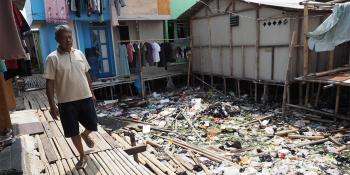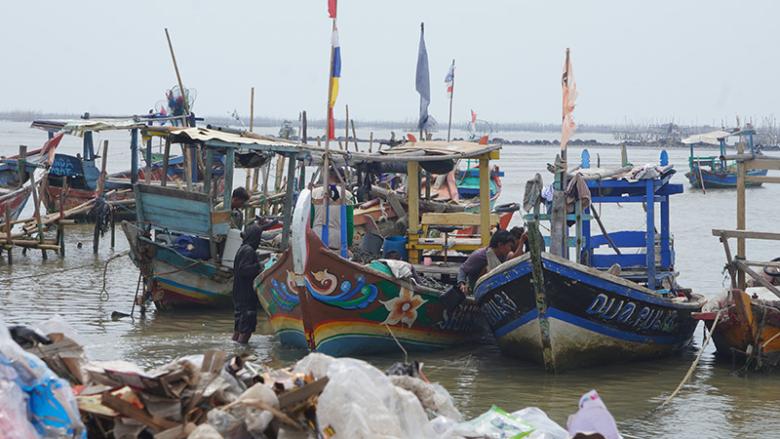
Concrete steps
Habitat for Humanity's global advocacy campaign Home Equals seeks policy changes at all levels to increase access to adequate housing in informal settlements.
Nearly 1.1 billion people worldwide are live in informal settlements, such as slums, riverbanks, railway tracks, and illegally on government or corporate land. Their situation is exacerbated by a lack of access to basic rights such as clean water, adequate sanitation, and secure land tenure, making them vulnerable to climate change.
“These individuals are often ignored, looked down upon, and deprioritized. They are frequently blamed and judged without understanding their background. Their difficult lives are worsened by the lack of access to basic rights such as clean water and adequate sanitation, legitimate land rights, and they are also vulnerable to climate change,” said Susanto, national director of Habitat for Humanity Indonesia.
According to him, a key element of the right to adequate housing is land tenure security, which guarantees legal protection against forced evictions, harassment, and other threats. The lack of land tenure security prevents families from accessing financing to improve their homes. This occurs because they lack collateral, formal employment, and have minimal income.
“Currently, both government and nongovernmental organizations have numerous housing programs, but these mostly target low-income individuals who meet the criteria for land ownership. These programs have yet to reach those living in informal settlements with extreme poverty, who cannot meet the requirements of financial institutions or banks.” said Susanto.
On this basis, Habitat for Humanity is committed to improving access to adequate housing through the ‘Home Equals’ campaign, which aims to amplify the voices of informal settlers and advocate for fairer policies.
To achieve this, Habitat for Humanity Indonesia collaborates with the Tangerang Regency Government to build adequate homes for those in need. This effort involves all community elements, especially village, sub-district, and regency governments, to provide and build adequate housing for those in need.
This program is located in Kampung Tanjung Kait, Desa Tanjung Anom, Kecamatan Mauk, Tangerang regency. The residents of Kampung Tanjung Kait live on land owned by the Tjo Soe Kong Temple Foundation, with inadequate housing conditions, limited access to basic services, and threats of disasters and climate change.
The Tanjung Kait area improvement program begins with increased participation through the Participatory Approach for Safe Shelter Awareness, or PASSA. This approach results in community agreements in area planning area improvements, financing, and land legality. The program is fully supported by the Mauk sub-district and regency government for the processes of land legality, permitting, and funding.
In addition to organizing the Tanjung Kait area, Habitat for Humanity Indonesia is collaborating with the Rujak Center for Urban Studies and the Tangerang regency government to develop recommendations for land, funding, and financing for the poor in informal settlements in Tangerang regency. This initiative aims to identify problems and formulate comprehensive recommendations to address them.
The study results provide several recommendations:
- Respect the right to adequate housing by promoting principles of collaboration and mutual cooperation, integrated solutions, diversity of solutions, and progressive realization;
- Establish land, funding, and financing policy prerequisites with an open and transparent database, structured institutions, and multi-stakeholder forums;
- Integrate agrarian reform as a land solution for the poor in informal settlements through steps such as recognizing rights, legalization, cooperation in use and utilization, redistribution, grants, state takeover, purchase and selling, and court decisions;
- Provide funding and financing solutions for housing and settlements by utilizing state budgets such as the national budget, regional budget, and village budget, national programs, philanthropy, corporate social responsibility and affordable financing institutions; and
- Develop an institutional roadmap with priority steps such as a regent’s decree on the formation of an agrarian reform task force, a regent’s regulation on housing quality improvement, and determining locations and action plans for housing quality improvement.
Slum areas
In a new brief titled “Slum Blind: The overlooked links between climate migration and informal settlements,” Habitat for Humanity reveals a blind spot in the discourse around climate-induced migration and adaptation efforts. Habitat highlights that most forcibly displaced people do not cross international borders, and most climate migrants are moving from rural to urban areas within their own countries, often residing in slums and other informal settlements.

Habitat Indonesia aims to promote climate adaptation in informal settlements that tend to host most of the climate-induced migrants,” said its national director. Photo of a fishing community in Mauk subdistrict, courtesy of Habitat for Humanity Indonesia.
Countries with large populations in urban informal settlements and expected to face the largest surge in internal climate migrants by 2050 include India, Pakistan, Bangladesh, the Philippines, and Indonesia. Implementing a climate migration perspective in policies to improve informal settlements is crucial in all countries, especially in these regions.
“Habitat wants to call attention to the opportunity to promote climate adaptation in places that need it most, specifically informal settlements, which host most climate-induced migrants within developing countries,” said Susanto.
Despite the challenges, Habitat for Humanity Indonesia is not only builds adequate housing but also empowers families to create better lives. Through the Home Equals initiative, Habitat for Humanity Indonesia is committed to advocating for basic rights such as access to adequate housing, land tenure security, climate resilience, and the availability of basic services for residents in informal settlements.
Susanto explained that the Home Equals campaign in Indonesia aims to improve the quality of life by 4%, the quality of national education by 28%, and national economic growth by 10.5%. He believes that everyone deserves a safe, healthy, and dignified life.
“We hope that with the support of all parties, significant changes will occur to improve the quality of life and create a better future for all. Let’s realize this vision together, where every home is a safe and comfortable place for all residents.”
This campaign is a concrete step in building a more prosperous and sustainable society by providing fair and adequate access to housing. Habitat for Humanity Indonesia is committed to continuing to collaborate with all parties to create broader and more sustainable positive change.
This article is translated from an article written in the Indonesian language that was published in Bisnis Indonesia newspaper on July 21, 2024.